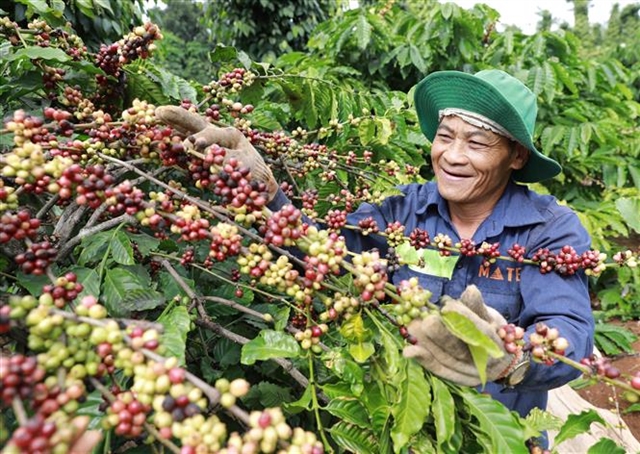Việt Nam's coffee exports to Japan are displaying positive trends, buoyed by rising selling prices amidst Japan's reduced coffee imports from global sources.

Việt Nam's coffee exports to Japan are displaying positive trends, buoyed by rising selling prices amidst Japan's reduced coffee imports from global sources.
According to data from the General Department of Customs, in August, Việt Nam shipped 9,100 tonnes of coffee to the Japanese market, valued at US$28.5 million. This marked a 3.1 per cent decrease in volume and a 2.3 per cent dip in value compared to July 2023, but a notable increase of 6.5 per cent in volume and a 37.6 per cent rise in value compared to August 2022.
In August 2023, the average export price of Vietnamese coffee to Japan reached $3,132 per tonne, up 0.9 per cent month-on-month and a significant 29.3 per cent surge compared to August 2022.
Over the first eight months of 2023, Việt Nam's coffee exports to Japan amounted to more than 78,700 tonnes, worth $218.9 million, representing a 1.1 per cent volume increase and 11.6 per cent growth in value year-on-year. During this period, the average export price of Vietnamese coffee to Japan reached $2,780 per tonne, up 10.4 per cent compared to the same period last year.
Notably, Việt Nam's robusta coffee exports to the Japanese market experienced double-digit growth compared to 2022's same period, with the proportion in the total export turnover to Japan increasing from 66.5 per cent in the first eight months of 2022 to 69.1 per cent in the first eight months of 2023.
Conversely, the proportion of Arabica coffee exports to Japan decreased from 10.36 per cent to 6.34 per cent during this period.
According to statistics from the International Trade Centre (ITC), Japan imported about 207,400 tonnes of coffee from around the world in the first seven months, valued at $873 million, down 19.1 per cent in volume and 20.4 per cent in value year-on-year. Japan reduced its coffee imports from major sources, including Việt Nam, Brazil, Colombia, Guatemala and Tanzania during this period.
Việt Nam stayed Japan's top coffee supplier in the first seven months of 2023, and its market share in Japan's total coffee imports grew from 27.65 per cent in 2022 to 31.38 per cent in 2023.
Experts believe that Japan's reduction in coffee imports is likely a short-term phenomenon, driven by economic recession and high inflation, which have led to decreased coffee demand. The outlook for the year-end appears more optimistic due to anticipated increased demand, as evidenced by Japan's renewed interest in coffee imports in July 2023.
In July 2023 alone, Japan’s coffee import increased by 20.6 per cent in volume and a 9.7 per cent in value compared to July 2022.
Japan is currently Việt Nam's fourth-largest coffee export market, following Germany, the US, and Italy. To further boost exports to the Japanese market, Vietnamese exporters should heed certain considerations.
For unroasted coffee beans, necessary documents, including a phytosanitary certificate and invoice, should be provided to the Plant Protection Station. If pests are detected, sterilisation may be required for compliance with standards. Meanwhile, roasted coffee beans do not require plant quarantine. Import procedures should follow the Food Sanitation Law, involving a Food Import Declaration with ingredient lists and additives.
When selling coffee in Japan, exporters need to adhere to labeling requirements under the Food Hygiene Law and Japanese Agriculture Standard (JAS) Law. Only coffee beans meeting JAS organic standards can be labeled as "JAS Organic". Foreign "organic" labels cannot be used unless JAS standards are met. — VNS





